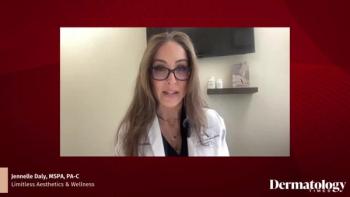
Baricitinib demonstrates long-term safety, efficacy for AD
In recently presented data at the 29th annual European Academy of Dermatology and Venereology (EADV) virtual congress, baricitinib demonstrated significant long-term safety and efficacy in treating moderate-to-severe atopic dermatitis.
New data released by Eli Lilly and Company reveals baricitinib (Olumiant, Eli Lily and Incyte) is a safe and effective long-term treatment for moderate-to-severe atopic dermatitis (AD), according to Eli Lilly and Company.1
This new study data comes from Lilly’s BREEZE-AD3 study, a phase 3, multicenter, randomized, double-blind clinical trial investigating the long-term safety and efficacy of the biologic in adult patients with moderate-to-severe AD. The study results were presented at the 29th annual European Academy of Dermatology and Venereology (EADV) Congress that was held virtually Oct. 29-31.
MORE:
"At Lilly, we recognize the sacrifices that people living with dermatologic diseases like AD are making to address the symptoms of this chronic, relapsing skin disease," says Lotus Mallbris, M.D., Ph.D., vice president of immunology development at Lilly. "We're encouraged by the long-term baricitinib efficacy and safety data being presented at EADV, which reinforce the potential role this medicine could play in helping people living with AD."
In the BREEZE-AD3 study, responders as assessed by the validated Investigator Global Assessment (vIGA) score of "clear or almost clear" skin (vIGA 0,1) and partial responders (vIGA 2) from one of the 16-week originating studies entered and continued treatment with baricitinib 2-mg or 4-mg once daily for an additional 52 weeks, according to the press release.1
Primary endpoints of the study included a proportion of patients with an IGA response of 0 or 1 at 16 weeks, 36 weeks and 52 weeks. Secondary endpoints included a proportion of patients achieving an IGA response of 0, 1 or 2, a proportion of non-responders achieving IGA 0 or 1, a proportion of participants achieving an Eczema Area and Severity Index (EASI) response of 75 from baseline and a proportion of patients with at least a 4-point improvement from baseline according to Itch Numeric Rating Scale (Itch NRS).
At the beginning of study (after 16 weeks of treatment in the originating studies), 45.7% of responders and partial responders on 4-mg of baricitinib had a vIGA-AD score of 0 or 1, while 40% had a vIGA-AD score of 0 or 1 after 68 weeks of continuous therapy.
Also, at the start of BREEZE-AD3 46.3% of responders and partial responders on 2-mg of baricitinib had a vIGA-AD score of 0 or 1, while 50% had a vIGA-AD score of 0 or 1 after 68 weeks of continuous therapy.
The study’s results demonstrate that baricitinib 4-mg and 2-mg dose groups were able to maintain clear or almost clear skin response rates through the 68-week treatment period.1
Additionally, the safety profile in this study was consistent with the known safety findings of baricitinib in previous 16-week, placebo-controlled AD studies.
"Baricitinib is part of a class of oral medicines called JAK inhibitors. These data support its potential use as a treatment for adults with moderate to severe AD," says Jonathan Silverberg, M.D., Ph.D., MPH, director of clinical research at George Washington University School of Medicine and Health Sciences. "These results demonstrate that baricitinib’s efficacy at achieving clear or almost clear skin could be sustained with continuous treatment."
Currently, baricitinib not yet approved by the U.S. Food and Drug Administration (FDA) to treat AD, however, it is approved to treat rheumatoid arthritis in the U.S. and over 60 countries. Most recently, the JAK inhibitor was approved to expand its indication to include AD in the European Union (EU).
Reference:
Company, E. (2020, October 31). EADV 2020: Lilly and Incyte Showcase New Data for Baricitinib for the Treatment of Moderate to Severe Atopic Dermatitis. Retrieved December 01, 2020, from https://www.prnewswire.com/news-releases/eadv-2020-lilly-and-incyte-showcase-new-data-for-baricitinib-for-the-treatment-of-moderate-to-severe-atopic-dermatitis-301163842.html
Newsletter
Like what you’re reading? Subscribe to Dermatology Times for weekly updates on therapies, innovations, and real-world practice tips.











